What If Your Managers Aren’t Taking Employee Complaints Seriously?
Are your managers taking employee complaints as seriously as they should? This issue has become even more pressing as employees navigate the challenges of the coronavirus pandemic, including new safety precautions, remote work transitions, and protecting their loved ones. According to our Workplace Culture Report, “one in ten employees said that they would not trust their management to take them seriously if they made a complaint.”
Our research highlights a troubling reality: some managers may inadvertently dismiss or mishandle complaints, creating long-term trust issues within the organization. While the data below primarily focuses on formal complaints and incidents, the lessons for managers apply to everyday interactions as well.
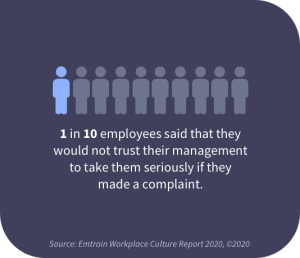
Why Aren’t Managers Addressing Employee Complaints Effectively?
Our data set, which includes responses from 40,000 employees across 125+ companies, reveals several factors that contribute to the mishandling of complaints. These include in-group/out-group dynamics, unconscious bias, power imbalances, and low social intelligence. These factors not only influence how managers respond to complaints but also determine whether employees feel safe enough to speak up.
In-Group/Out-Group Dynamics and Employee Complaints
In-group/out-group dynamics shape the workplace experience. When managers belong to a dominant in-group, they may unconsciously dismiss complaints from employees in the out-group.
For example:

- In one scenario from our training, an older employee reports ageist remarks from a colleague. The manager initially dismisses the concern, promising to address it later. Learners assessing the situation often fail to recognize it as harassment, highlighting a blind spot in workplace culture. Watch the scene here.
We ask learners to assess the severity of the incident, and only 9% correctly identify it as harassment.
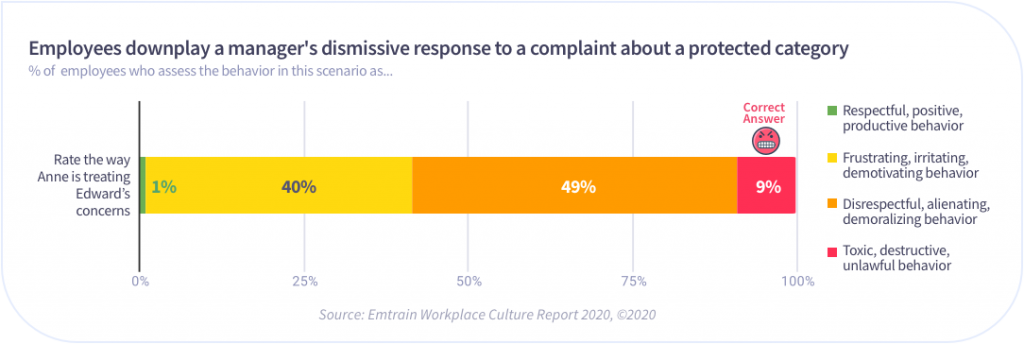
In another scenario, an employee repeatedly misgenders a transgender colleague. Despite the clear impact, 1 in 10 learners incorrectly believe the behavior isn’t exclusionary. Watch the scene below.

When asked if it is reasonable for the colleague to feel excluded by this behavior, almost 1 in 10 people say it was not. 83% of employees rate this scenario as less severe on the Workplace Color Spectrum® than it actually is.
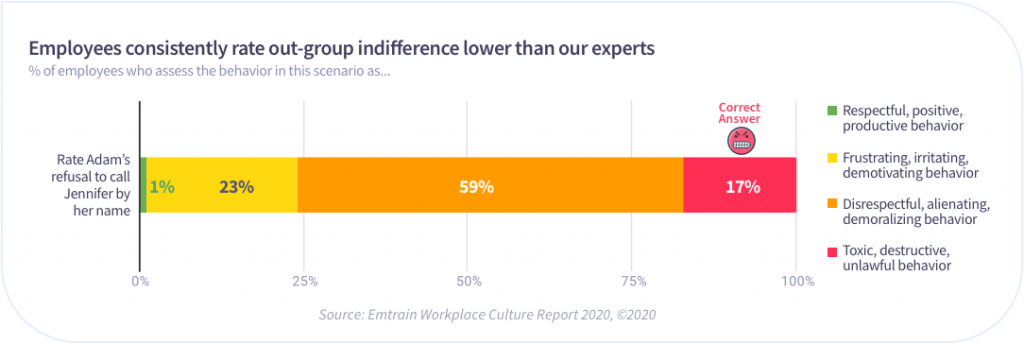
Such dynamics make it harder for out-group employees to feel confident about raising complaints, compounding the issue.
An out-group employee is in a complicated position if they have a complaint to raise
In-group/out-group dynamics don’t just have implications for how managers handle complaints. The actions of the employee are also affected. When look at the group of learners who indicate that they “have had to minimize part of their heritage or personal identity to fit into a job” (a good proxy for an out-group), we find that they are 18% less likely to feel comfortable speaking up and 23% less likely to think their management will take the complaint seriously if they do complain.
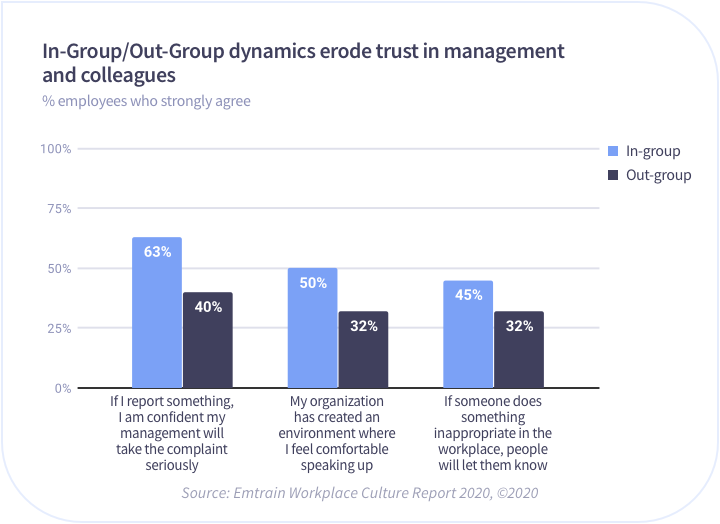
Managers dismissing or mishandling complaints due to a variety of social dynamics may create a perpetual cycle that challenges the trust between management and colleagues.
Managers Lack Empathy Toward Employee Complaints
Only 31% of employees say their managers demonstrate empathy and curiosity about their concerns. This lack of empathy can create a perception that managers prioritize their own interests over employee well-being.
Consider this scenario: A manager reassigns an employee who raised a complaint about her to a peer, claiming the move is to reduce project friction. However, the employee interprets the action as retaliation, a belief shared by 41% of learners in our training.
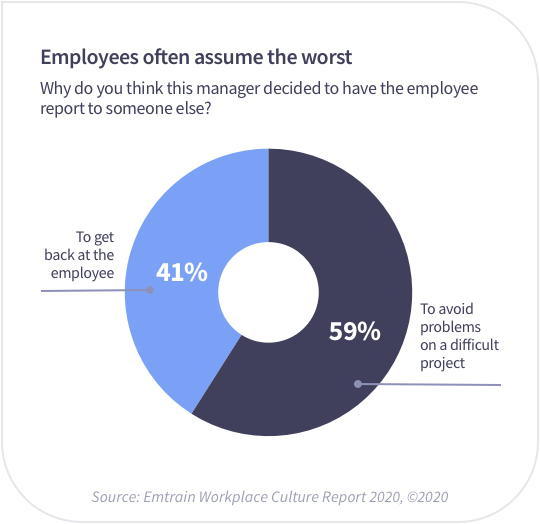
When managers fail to show empathy, employees are less likely to trust them with complaints, fearing retaliation or dismissal.
Toxic Workplace Norms Undermine Employee Complaints
Our research shows a strong correlation between two key factors:
- How frequently leaders get away with disrespectful behaviors.
- Employees’ confidence that their complaints will be taken seriously.
In workplaces where bad behavior is ignored, employees are less likely to report issues, allowing toxicity to fester. This creates a cycle of mistrust and disengagement.
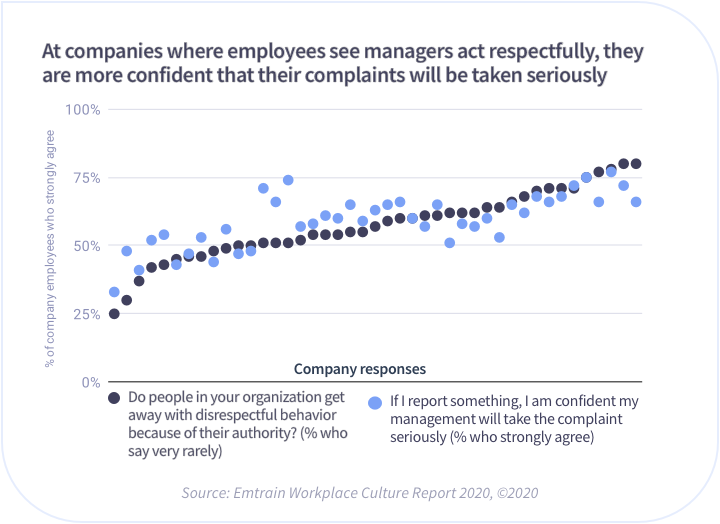
It makes perfect sense that in an organization where bad behavior is ignored or even permitted for certain leaders in authority, employees wouldn’t expect their complaint to be taken seriously. To extrapolate further, it’s perfectly logical that people would feel less comfortable reporting a situation they experienced or observed, thus not even sun-shining the bad behavior, leaving the perception that things are just fine when in fact, they are quite toxic. This unhealthy workplace culture then becomes a negative norm.
For the employee who does raise a complaint despite significant headwinds, it magnifies the seriousness of the complaint and their bravery to raise it. Managers should have that in mind too.
Positive Organizational Norms Can Strengthen Complaint Handling
Establishing strong workplace norms can guide managers in handling complaints fairly and empathetically. When employees see respectful interactions modeled by leadership, they feel more confident that their concerns will be addressed.
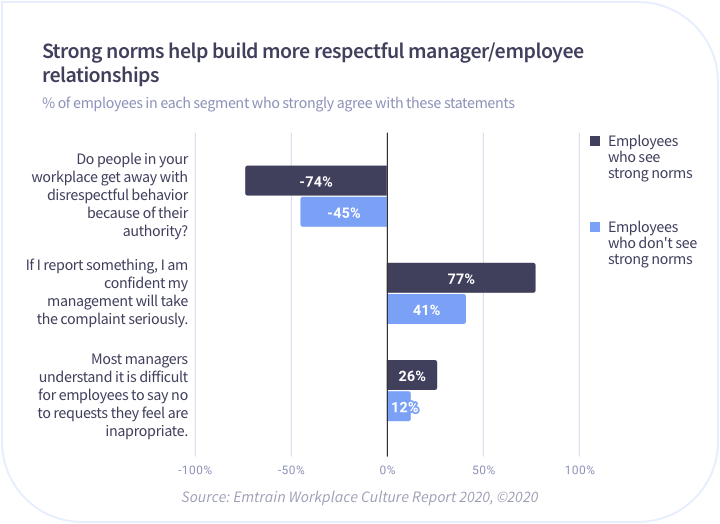
The Emtrain Workplace Color Spectrum is a valuable tool for understanding and addressing employee complaints. It categorizes workplace interactions along a spectrum, ranging from healthy to toxic behaviors. By identifying where specific behaviors fall on this scale, managers can better recognize patterns of exclusion, microaggressions, or outright misconduct. Incorporating this framework into complaint handling helps ensure that managers approach each situation with clarity, empathy, and a commitment to maintaining a respectful workplace culture.
Managers must remember that when an employee raises a complaint, they are placing trust in the system. A thoughtful and unbiased response can strengthen that trust and set a positive example for others.
Note: This blog post includes data from Emtrain’s Workplace Culture Report, which analyzed responses from over 40,000 employees completing workplace harassment and unconscious bias training.








